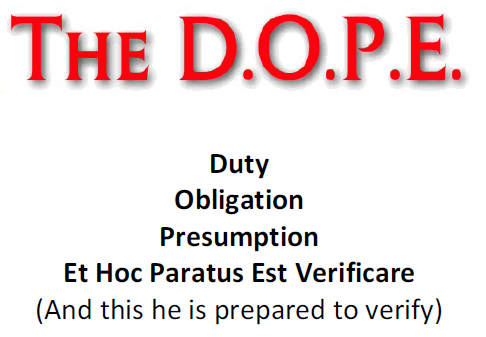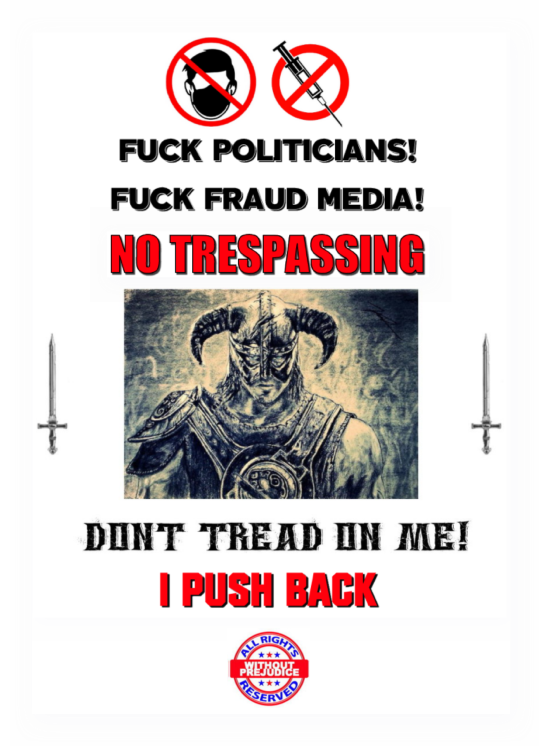














“A catch-all provision
imposing an annual license fee on any person,
firm, association, partnership, or corporation engaged in any business,
occupation, or profession, not subject to any specific license fee
imposition
has been held to violate the due process clause of the Federal
Constitution
and a provision of the state Constitution guaranteeing to all citizens
the enjoyment of life and liberty, with the means of acquiring and
possessing
property”.
51 Am Jur.2d. §17, p. 24.
“There are, of course, limitations on the legislature’s powers classifying various pursuits with respect to licensing requirements”. Ibid p. 36
“A state cannot impose
restrictions on the acceptance of a license that
will deprive the licensee of his constitutional[ly secured]
rights”.
Ruckenbrod v.
Mullins, 102 Utah 548, 133 P.2d. 325, 144
ALR 839 [My addition in the brackets for clarification purposes]
"A contract may be rescinded
by the act of a party entitled and desiring
to rescind."
McNeese v. McNeese,
(1923) 190 Cal. 402, 213 P. 36.
A contract obtained under any
element of fraud such as non-disclosure,
misrepresentation, withholding of pertinent facts can be rescinded by
serving
a notice of rescission.
Prewitt v. Sunnymead Orchard Corp.,
189 Cal. 723.
“A writing is ‘void ab initio’
in the case of fraud in the inception,
and it need not be formally rescinded as a prerequisite to right of
avoidance”.
Bonacci v. Massachusetts Bonding Ins. Co.,
(1943) 58 CA 2d 657,664.
(Ab initio = from the beginning)
“Silence can only be equated
with fraud where there is a legal or moral
duty to speak, or where an inquiry left unanswered would be
intentionally
misleading”.
U.S. v. Prudden, 424 F. 2nd 1021 5th
Cir. (1970), U.S.
v. Tweel, 550 F. 2nd 297 (1977)
“According to” the Legislature:
Statutes of California, 1893, p.57, sect.1 (Feb.28, 1893) “SECTION 1. All persons who have, or shall hereafter have, claims on contract or for negligence against the State not allowed by the State Board of Examiners, are hereby authorized, on the terms and conditions herein contained, to bring suit thereon against the State in any of the Courts of this State of competent jurisdiction, and prosecute the same to final judgment. The rules of practice in civil cases shall apply to such suits, except herein otherwise provided”.
Contract issues are processed
according to the rules of Civil Procedure.
Welsbach Company v. State of California,
206 Cal. 556,
licenses are founded on contract and subject to civil procedure.
[un-refuted affidavits are the
basis for summary judgment and res judicata].
Res Judicata and collateral estoppel are applicable in criminal
proceedings
independent of the concept of double jeopardy.
People v. Gephart, (1979) 93 CA3d.
989, 156 Cal.Rptr. 489. [Emphasis
mine]
Prosecutor lost jurisdiction
due to the failure to act within the time
frame stated in the documents.
Mumaw v, City of Glendale, (1969) 270
Cal.App.2d. 454, 76 Cal.Rptr.
245 [time limits are jurisdictional] [Emphasis mine]
Under the doctrine of Res
Judicata, any issue litigated in an administrative
arena, cannot be re-litigated under the doctrine of Res Judicata.
City and County of San Francisco v.
Padilla, (1972) 23 Cal.App3d.
388, 100 Cal.Rptr. 223, 229

CALIFORNIA EVIDENCE CODE
§180. "Personal property" includes money, goods, chattels, things in action, and evidences of debt.
§185. "Property" includes both real and personal property.
§637. Ownership of things possessed
The things which a
person possesses are presumed to be owned
by him.
(Stats. 1965, c. 299, § 2)
§638. Ownership of property by person who exercises acts of ownership
A person who
exercises acts of ownership over property is presumed
to be the owner of it.
(Stats. 1965, c. 299, § 2)
CALIFORNIA CIVIL CODE §2881. Lien, how created
A lien is created :
1. By contract of the parties; or
2. By operation of law
Lien. A charge or security or incumbrance upon property. Theatre Realty Co. v. Aronberg-Fried Co., C.C.A.Mo., 85 F.2d 383, 388, McCarty v. Robinson, 222 Ala. 287, 131 So. 895, 896; Springer v. J.R. Clark Co., C.C.A. Minn., 138 F.2d 722, 726. Preferred or privileged claims given by statute or by admiralty law. American Legion Post No. 279 v. Barrett, 371 Ill. 78, 20 N.E. 2d 45, 50; Marshall v. People of State of new York, 254 U.S. 380, 41 S.Ct. 143, 145, 65 L.Ed. 315.
BLACK’S LAW DICTIONARY, FOURTH EDITION, p. 1072
License Fee or Tax. Charge imposed by sovereign for a privilege. Pennsylvania Liquor Control Board v. Publicker Commercial Alcohol Co., 347 Pa. 555, 32 A.2d 914, 917. BLACK’S LAW DICTIONARY, FOURTH EDITION, p. 1069
CALIFORNIA CODE OF CIVIL PROCEDURE
§25. Civil action arise out of obligations or injuries
A civil action arises out of:
1. An obligation;
2. An injury.
The code sections above HAVE TO
be bounced off the two below, because the two below are the benchmark
for the drafting of the ones above, they comport.
CALIFORNIA CODE OF CIVIL PROCEDURE
1897. The organic law is the constitution of government, and is altogether written. Other written laws are denominated statutes. The written law of this State is therefore contained in its Constitution and statutes, and in the Constitution and statutes of the United States.
CALIFORNIA CODE OF CIVIL PROCEDURE
1898. Statutes are public or private. A private statute is one which concerns only certain designated individuals, and effects only their private rights. All other statutes are public, in which are included statutes creating or affecting corporations.
CIVIL CODE
654. The ownership of a thing is the right of one or more persons to possess and use it to the exclusion of others. In this Code, the thing of which there may be ownership is called property.
655. There may be ownership of all inanimate things which are capable of appropriation or of manual delivery; of all domestic animals; of all obligations; of such products of labor or skill as the composition of an author, the good will of a business, trade marks and signs, and of rights created or granted by statute.
657. Property is either:
l. Real or immovable; or,
2. Personal or movable.
658. Real or immovable property consists of:
l. Land;
2. That which is affixed to land;
3. That which is incidental or appurtenant to land;
4. That which is immovable by law; except that for the purposes of sale, emblements, industrial growing crops and things attached to or forming part of the land, which are agreed to be severed before sale or under the contract of sale, shall be treated as goods and be governed by the provisions of the title of this code regulating the sales of goods.
659. Land is the material of the earth, whatever may be the ingredients of which it is composed, whether soil, rock, or other substance, and includes free or occupied space for an indefinite distance upwards as well as downwards, subject to limitations upon the use of airspace imposed, and rights in the use of airspace granted, by law.
678. The ownership of property is either:
1. Absolute; or,
2. Qualified.
679. The ownership of property is absolute when a single person has the absolute dominion over it, and may use it or dispose of it according to his pleasure, subject only to general laws.
680. The ownership of property is qualified:
1. When it is shared with one or more persons;
2. When the time of enjoyment is deferred or limited;
3. When the use is restricted.
681. The ownership of property by a single person is designated as a sole or several ownership.


CASES AND PROBLEMS
ON
CONTRACTS
John D. Calamari
Wilkinson Professor of Law, Fordham University
Joseph M. Perillo
Professor of Law, Fordham university
West Publishing Co.
2004
________________
American Casebook Series
Parol (= oral) Evidence and Interpretation
The meaning of words cannot be ascertained in a vacuum.* The function of interpretation of a contract is to ascertain the intention of the parties as manifested by the words they used to evidence their agreement.
...it requires that a court attempt to place itself in the same situation as that of the parties at the time of the execution.
* This is clearly recognized by Wigmore, who traces the development of the parol evidence rule and states that:
“The truth had finally to be recognized that word always need interpretation; that the process of interpretation inherently and invariably means the ascertainment of the association between words and external objects; and a free resort to extrinsic matters for applying and enforcing the document”.
“Once freed from the primitive formalism which views the
document as
a self-contained and self-operative formula, we can fully appreciate
the
modern principle that the words of a document are never anything but
indices
to extrinsic things, and that therefore all the circumstances must be
considered
which go to make clear the sense of the words,-that is, their
association
with things’.
9 Wigmore on Evidence §2470 at p. 227 (3d. Ed. 1940)
RESCISSION OF CONTRACT
In a sense, anyone who is fraudulently induced to enter a contract is “injured”; his “interest in making a free choice and in exercising his own best judgement in making decisions with respect to economic transactions and enterprises has been interfered with”. (See McCleary, Damage as a Requisite to recission for Misrepresentation, 36 Mich.L.Rev.1, 227, 245)
“...What is plainly injurious to good faith ought to be considered as a fraud sufficient to impeach a contract”, and that an improvident agreement may be avoided - “because of surprise, or mistake, want of freedom, undue influence, the suggestion of falsehood, or the suppression of truth”
AVOIDANCE FOR MISCONDUCT OR MISTAKE, UNCONSCIONABILITY AND DUTY TO READ
“An ‘unconscionable contract’ has been defined to be such as no sensible man not under delusion, duress or in distress would make, and such as no honest and fair man would accept. There exists here and ‘inequality so strong, gross and manifest that it is impossible to state it to a man of common sense without producing an exclamation at the inequity of it’. ‘Where the inadequacy of the price is so great that the mind revolts at it the court will lay hold on the slightest circumstances of oppression or advantage to rescind the contract’”.
“It is not the policy of the law to restrict business dealings or to relieve a party of his own mistakes of judgment, but where on party has taken advantage over him, and the latter, owing to his condition, has encumbered himself with a heavy liability or an onerous obligation for the sake of a small or inadequate present gain, there will be relief granted”. Stiefler v. McCullough (1933), 97 Ind.App. 123, 174 N.E. 823
It seems a deplorable abuse of justice to hold a man of poor education, to a contract prepared by the attorneys of American Oil, for the benefit of American Oil which was presented to Weaver on a “take it or leave it basis”.
“These principles are not foreign to the law of
contracts. Fraud
and duress are not the only grounds upon which courts refuse to enforce
contracts. The law is not so primitive that it sanctions every
injustice
except brute force and downright fraud. More specifically, the
courts
generally refuse to lend themselves to the enforcement of a ‘bargain’
in
which one party has unjustly taken advantage of the economic
necessities
of the other”.
Justice Frankfurter in dissenting opinion in the United States v.
Bethlehem
Steel Corp. (1942) 315 U.S. 289, 326, 62 S.Ct. 581, 599, 86 L.Ed. 855,
876
...in present-day commercial life the standardized mass contract has appeared. It is used primarily by enterprises with strong bargaining power and position. The weaker party, in need of the good or services, is frequently not in a position to shop around for better terms, either because the author of the standard contract has a monopoly (natural or artificial) or because all competitors use the same clauses.
Judge Frankfurter’s dissent was written nearly twenty years ago. It represents a direction and philosophy which the law, at that time was taking and is now known as the parole evidence rule. The parole evidence rule states that an agreement or contract, signed by parties is conclusively presumed to represent and integration or meeting of the minds of the parties. This is an archaic rule from the common law. The objectivity of the rule has as its only merit its simplicity of application which is far outweighed by its failure in many cases to represent the actual agreement, particularly where a printed form prepared by one party contains hidden clauses unknown to the other party is submitted and signed.
When a party can show that the contract, which is sought to be enforced, was in fact an unconscionable one, due to a prodigious amount of bargaining power on behalf of the stronger party, which is used to the stronger party’s advantage and is unknown to the lesser party, causing a great hardship and risk on the lesser party, the contract provision, or the contract as a whole, if the provision is not separable, should not be enforceable on the grounds that the provision is contrary to public policy. The party seeking to enforce such a contract has the burden of showing that the provisions were explained to the other party and came to his knowledge and there was in fact a real and voluntary meeting of the minds and not merely an objective meeting.
Without regard to whether or not he was aware of its contents, a person will be relieved of his obligations under a contract under circumstances falling into two main categories: (a) where the contract is not enforceable because of occurrences or omissions (fraud, concealment, etc.) Surrounding its execution and where, (2) the contract is not enforceable because of the nature or subject of the contract (illegality of subject mater).
An adhesion contract is one that has been drafted by unilaterally by the dominant party and then presented on a “take it or leave it” basis to the weaker party, who has no real opportunity to bargain about its terms. (Restatement 2d, Conflict of Law §332a, Comment e) (C.J.S. Contracts §10 p. 581.)
(C.J.S. is a law encyclopedia series, Corpus Juris
Secundum)
Quod Initio Non Valet, Tractu Temporis Non Valet
A thing void in the beginning does not become valid by lapse of time
CONDITIONS, PERFORMANCE AND BREACH
It is the province of the courts to interpret (and not to make) contracts by ascertaining the legal import of the language employed by the parties themselves to express their agreement. Dover Glass Works Co. v. American Fire Ins. Co., 1 Marv. 32, 29 A. 1039 (1894). Our function is not to re-write or re-state what the parties have said. We read what is written and when it is plain, when only one meaning can be found in the words used, our duty is to state that meaning and go on to the next step in the judicial process.
At comment f to§237 of Restatement (second) of Contracts, supra pp. 540 -41, we find the following analysis of the reasonable expectations doctrine:
“Although customers typically adhere to standardized agreements and are bound by them without even appearing to know the standard terms in detail, they are not bound to unknown terms which are beyond the range of reasonable expectation. A debtor who delivers a check to his creditor with the amount blank does not authorize the insertion of an infinite figure. Similarly, a party who adheres to the other part has reason to believe that the adhering party would not have accepted the agreement if he had known that the agreement contained the particular term. Such a belief or assumption may be shown by the prior negotiations or inferred from the fact that the term is bizarre or oppressive, from the fact that it eviscerates the non-standard terms explicitly agreed to, or from the fact that it eliminates the dominant purpose of the transaction. The inference is reinforced if the adhering party never had and opportunity to read the term, or if it is illegible or otherwise hidden from view. This rule is closely related to the policy against unconscionable terms and the rule of interpretations against the draftsman”.



BLACK'S LAW DICTIONARY 1st Ed., 1891 BLACK'S LAW DICTIONARY 4th Ed, 1951 BOUVIER'S LAW DICTIONARY, 1856





